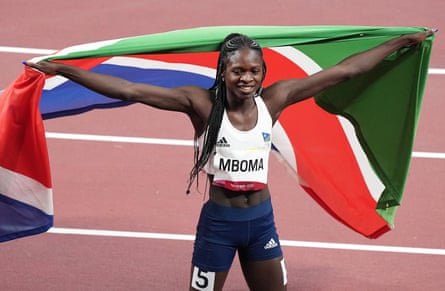Between 50 and 60 athletes who went through male puberty have been finalists in the female category in global and continental track and field championships since 2000, according to a senior World Athletics official.
World Athletics has introduced SRY screening, a gene test which uses a cheek swab to assess if someone is biologically male or female, for the world championships in Tokyo.
In a presentation to a scientific panel in Tokyo on Friday, Dr Stephane Bermon, head of health and science at World Athletics, outlined why the sport’s governing body believes such screens are necessary as he presented data collected over the past 25 years.
He said that it showed that athletes with differences of sex development (DSD), who have a 46 XY karyotype with male testes but were reported female at birth, were significantly “over-represented” in major finals and that it “compromises the integrity of the female competitions”.
“Everyone is watching World Athletics and we are leading in this area,” Bermon said before telling his audience that there were “approximately 50-60 cases of DSD in athletics”.
In total between 2000 and 2023, Bermon said there had been 135 DSD finalists in elite international events, given some of the 50 to 60 athletes competed in more than one final.
He also showed a slide that said that DSD cases are 151.9 times more likely than would be expected given the number of DSD individuals in the general population.
The numbers, which were derived by anti-doping tests that revealed high testosterone levels – and arguably therefore may not capture every case – are significantly higher than many in the sport had expected.
There have been several high-profile cases of athletes with a DSD winning global medals, most prominently the South African 800m runner Caster Semenya, who won Olympic gold at the 2012 and 2016 Games.

Namibia’s Christine Mboma also made significant headlines four years ago when she claimed a silver medal in the 200m at the Tokyo 2020 Games.
Neither athlete has competed at elite level since World Athletics introduced rules requiring DSD individuals to suppress their testosterone levels.
When the new SRY testing policy was unveiled, Sebastian Coe, the president of World Athletics, made it clear his determination to ensure only biological females competed in the category.
after newsletter promotion
“The philosophy that we hold dear in World Athletics is the protection and the promotion of the integrity of women’s sport,” he said. “It is really important in a sport that is permanently trying to attract more women that they enter a sport believing there is no biological glass ceiling.
“The test to confirm biological sex is a very important step in ensuring this is the case. We are saying, at elite level, for you to compete in the female category, you have to be biologically female. It was always very clear to me and the World Athletics Council that gender cannot trump biology.”
The move has been subject some criticism from within the scientific and academic community, most notably from Andrew Sinclair, the professor who discovered the SRY gene. Sinclair decried using the SRY gene test to determine biological sex as “overly simplistic” and not “cut and dried”.

 3 months ago
90
3 months ago
90

















































